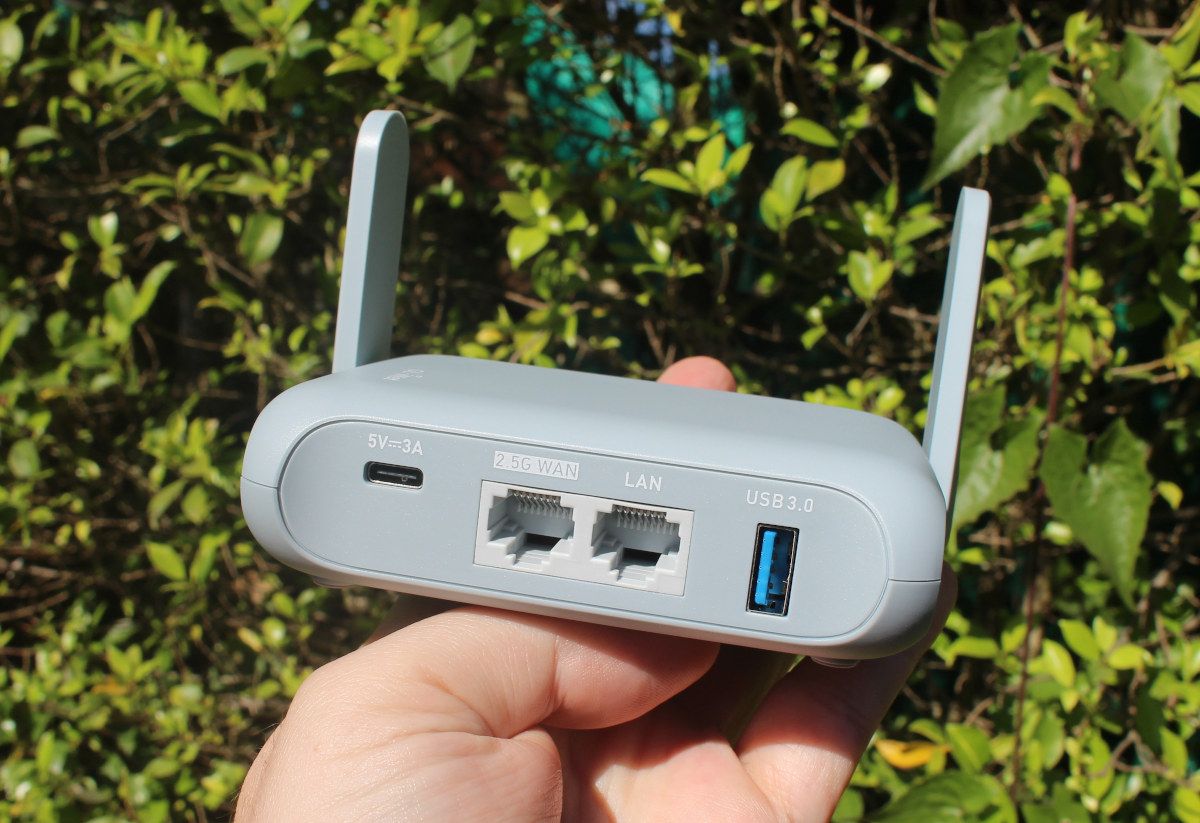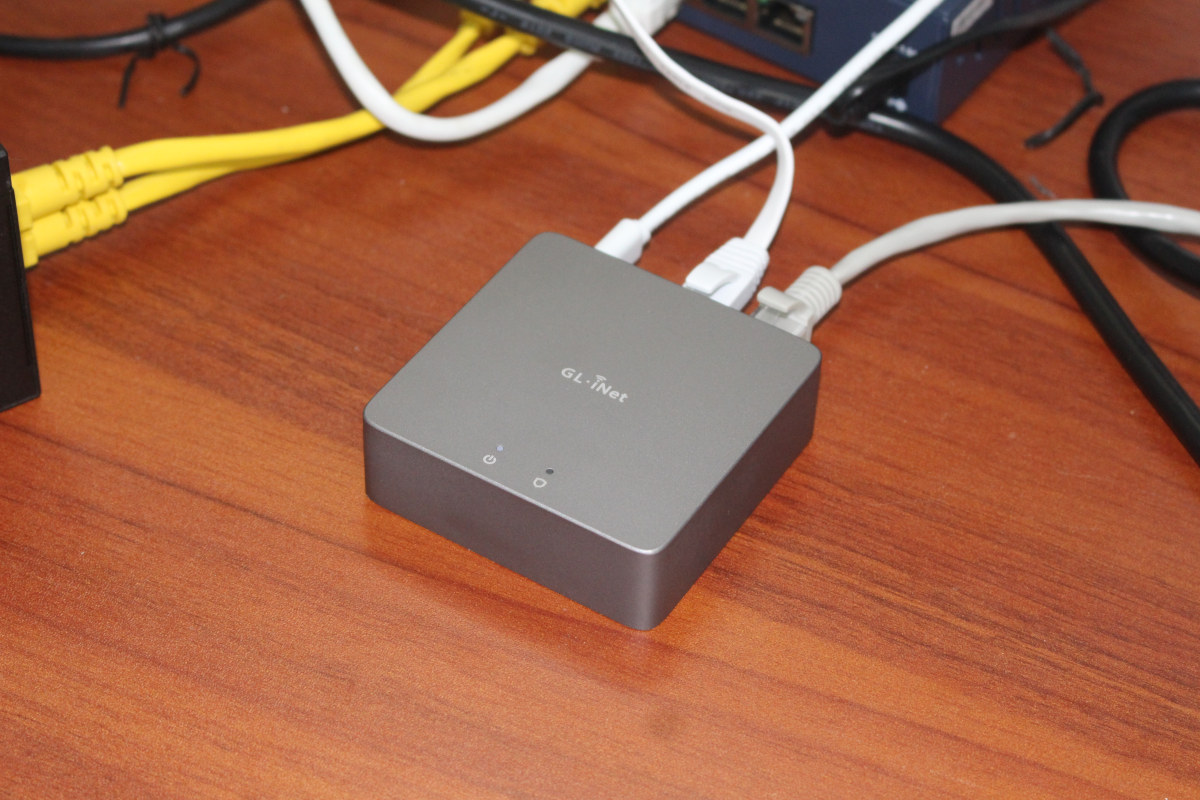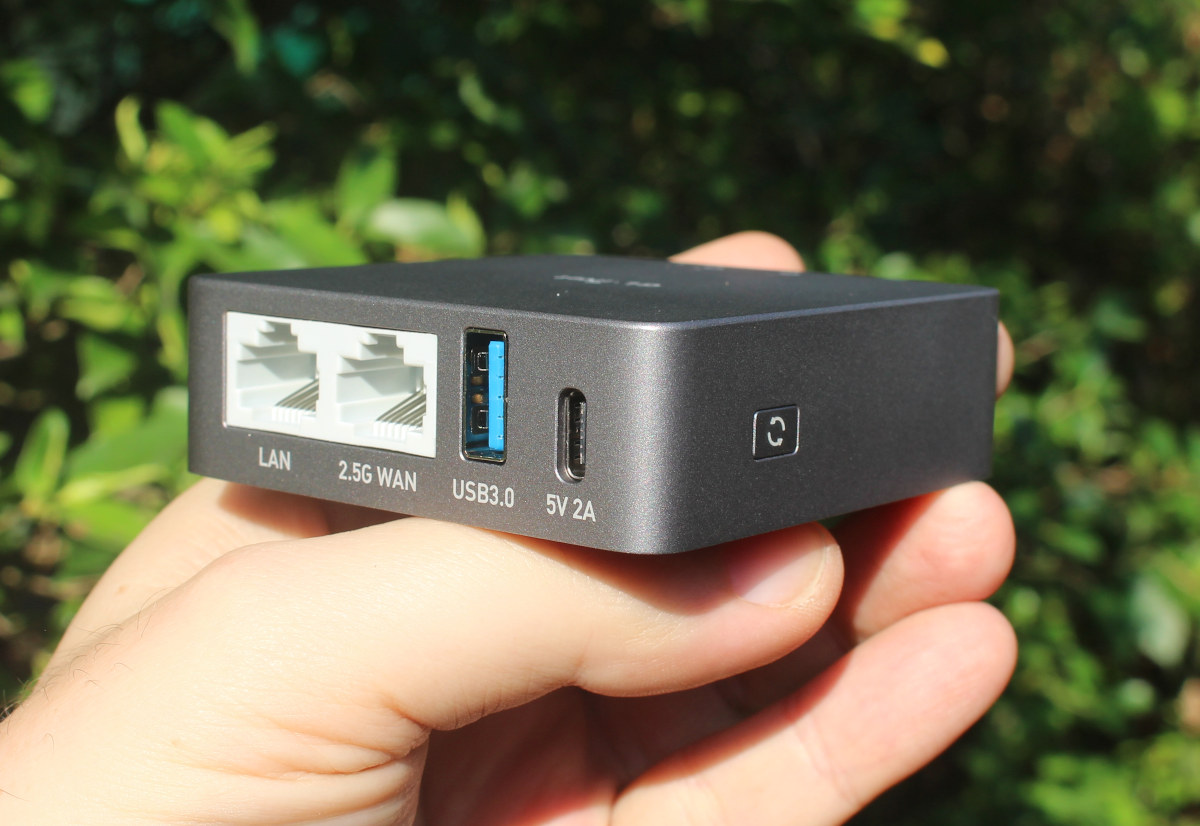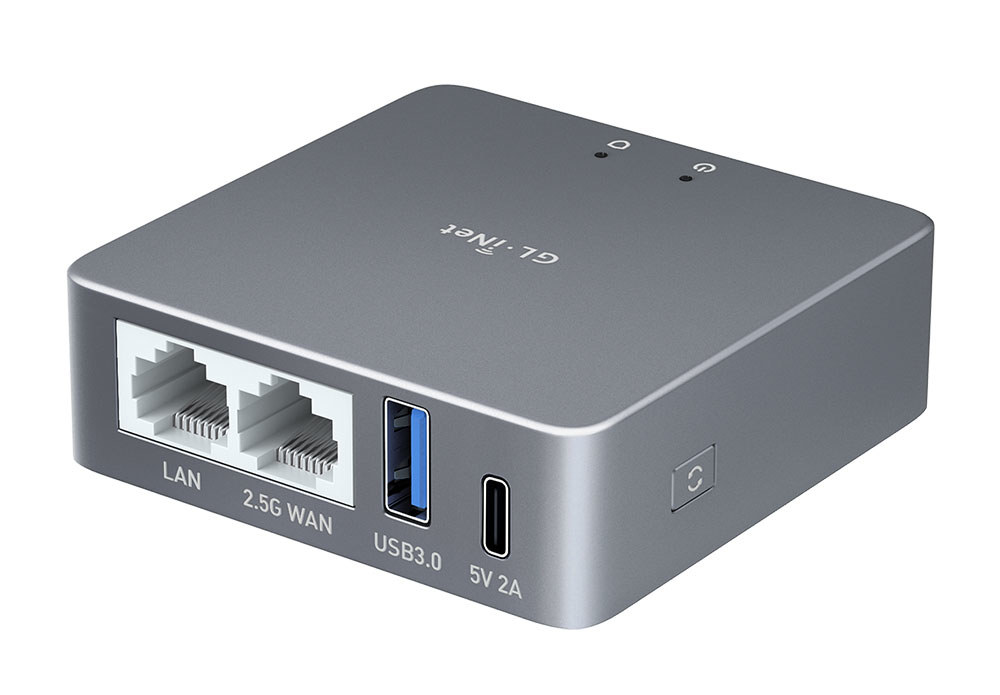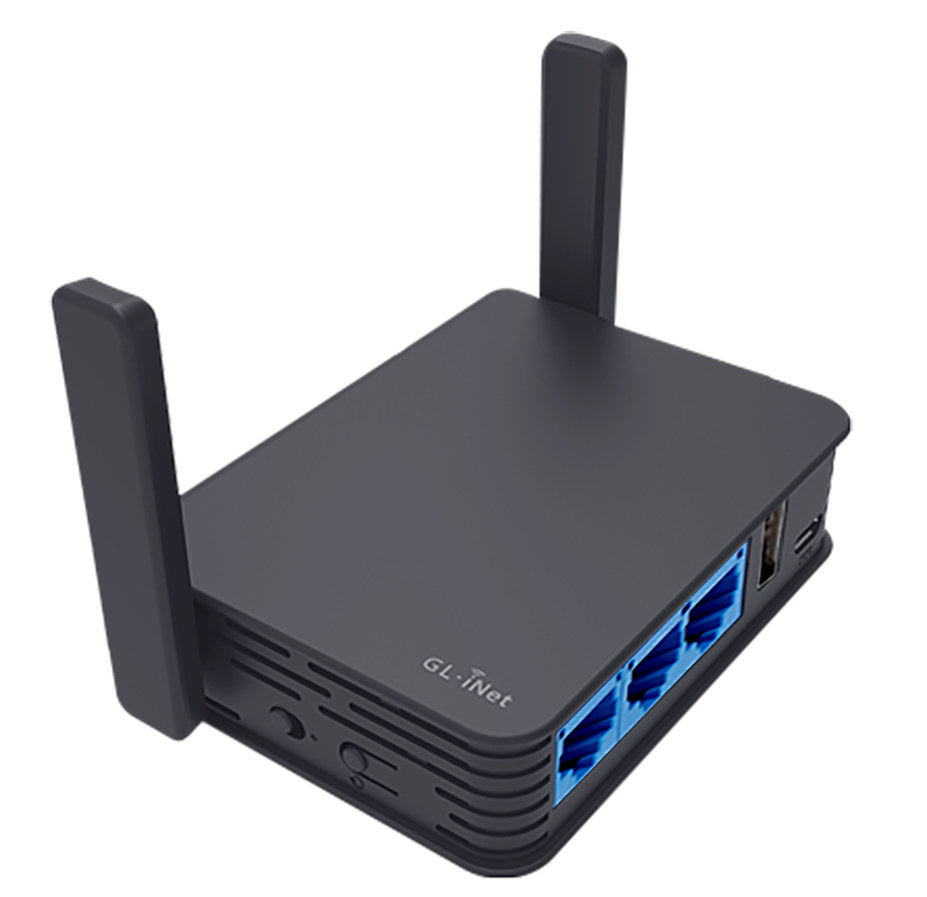GL.iNet Beryl AX (GL-MT3000) is a pocket-sized Wi-Fi 6 router running OpenWrt on a MediaTek MT7981B (Filogic 820) dual-core processor @ 1.3 GHz and equipped with a 2.5GbE port, a Gigabit Ethernet port, and a USB 3.0 port. The hardware is basically the same as the Brume 2 (GL-MT2500A) security gateway, except it adds support for WiFi 6 connectivity and as an AX3000 router more than doubles the bandwidth compared to the earlier Beryl (GL-MT1300) AC1300 router. The company has sent me a sample so I’ll start the two-part review by checking the specifications, doing an unboxing, and tearing it down to have a closer look at the hardware design, before trying out OpenWrt and testing WiFi 6 and 2.5GbE performance in the second part of the review. GL.iNet GL-MT3000 specifications Beryl AX specifications: SoC – MediaTek MT7981B (Filogic 820) dual-core processor @ 1.3 GHz System Memory – 512MB DDR4 […]
Brume 2 router review with WireGuard, OpenVPN, Tor, and Adguard Home
We started the review of GL.inet GL-MT2500A security gateway, aka Brume 2, with an unboxing and teardown, and I’ve now had time to test the router in more detail so I’ll report my experience using the router with OpenVPN and WireGuard VPN, Tor, Adguard Home, and more. In a nutshell, it’s super easy to use, unless your ISP causes troubles, which it did in this case. Brume 2 connection and initial setup I connected the WAN port of the Brume 2 router to 3BB’s modem router (3BB is an ISP in Thailand), the LAN port to my laptop, and finally the USB-C power supply (power draws is 2.3 Watts at idle). Let’s now go to the dashboard using the default IP (192.168.8.1). This will take us through the configuration wizard to select the language and set up the admin password. I was then immediately greeted by an “Upgrade Reminder” and […]
GL.iNet GL-MT2500A security gateway review – Part 1: Unboxing and teardown
The Brume 2 security gateway/router is powered by a MediaTek MT7981B (Filogic 820) dual-core processor @ 1.3 GHz and is available as the GL-MT2500A with a metal enclosure or the GL-MT2500 with a plastic case. GL.iNet sent me the GL-MT2500A for review. In the first of the review, we’ll have a look at the device and accessories, and tear it down to check out the hardware design and main components. I’ll then need some time to test OpenWrt 21.02 and features such as WireGuard and OpenVPN, AdGuard Home, Tor Anonymity, and soon. GL.iNet GL-MT2500A (Brume 2) unboxing The router ships with a short Ethernet cable, a 5V/2A USB Type-C power supply with EU, US, and UK plug adapters, and some minimal documentation that points to the users to more detailed online documentation and support on the company’s Facebook page. There’s not much too see on the front panel and right […]
Brume 2 – OpenWrt “security gateway” with MediaTek MT7981B SoC supports WireGuard VPN
GL.inet Brume 2 is an OpenWrt router, or rather a “security gateway” as the company calls it, powered by a MediaTek MT7981B (Filogic 820) dual-core Cortex-A53 processor, and equipped with a 2.5GbE WAN port and a Gigabit Ethernet LAN port. The device also comes with a USB 3.0 port for storage and a USB Type-C port for power. It is offered with either a plastic enclosure (GL-MT2500 model) or an aluminum allow case (GL-MT2500A model), and with WireGuard and OpenVPN, is suitable to host a VPN server and “monitor, manage, and configure SD-WAN settings”. Brume 2 (GL-MT2500/GL-MT2500A) specifications: SoC – MediaTek MT7981B (Filogic 820) dual-core processor @ 1.3 GHz System Memory – 1GB DDR4 Storage – 8GB eMMC flash Networking 1x 2.5 Gbps Ethernet WAN port 1x Gigabit Ethernet LAN port USB – 1x USB 3.0 Type-A port, 1x USB Type-C port for power Misc – Reset button, Power and […]
Linux 5.7 Released – Main Changes, Arm, MIPS and RISC-V Architectures
OK… I’m a bit late on that one. Linus Torvalds released Linux 5.7 last week: So we had a fairly calm last week, with nothing really screaming “let’s delay one more rc”. Knock wood – let’s hope we don’t have anything silly lurking this time, like the last-minute wifi regression we had in 5.6.. But embarrassing regressions last time notwithstanding, it all looks fine. And most of the discussion I’ve seen the last week or two has been about upcoming features, so the merge window is now open and I’ll start processing pull requests tomorrow as usual. But in the meantime, please give this a whirl. We’ve got a lot of changes in 5.7 as usual (all the stats look normal – but “normal” for us obviously pretty big and means “almost 14 thousand non-merge commits all over, from close to two thousand developers”), So the appended shortlog is only […]
Linux 5.6 Release – Main Changes, Arm, MIPS & RISC-V Architectures
Linus Torvalds has just announced the release of Linux 5.6 on the Linux Kernel Mailing List: So I’ll admit to vacillating between doing this 5.6 release and doing another -rc. This has a bit more changes than I’d like, but they are mostly from davem’s networking fixes pulls, and David feels comfy with them. And I looked over the diff, and none of it looks scary. It’s just slightly more than I’d have preferred at this stage – not doesn’t really seem worth delaying a release over. So about half the diff from the final week is network driver fixlets, and some minor core networking fixes. Another 20% is tooling – mostly bpf and netfilter selftests (but also some perf work). The rest is “misc” – mostly random drivers (gpio, rdma, input) and DTS files. With a smattering of fixes elsewhere (a couple of afs fixes, some vm fixes, etc). […]
GL.iNet Slate OpenWrt Travel Router Supports Tor, Wireguard VPN, and Cloudflare DNS over HTTPS/TLS
A couple of months ago, we wrote about GL.iNet Mudi portable WiFi router with built-in 4G LTE connectivity and supporting features such as the Tor Project, up to 25 VPN providers, and Cloudflare DNS over HTTPS or TLS. Mudi was launched on Kickstarter and should start shipping very soon, but I was informed about another OpenWrt travel router from the company with GL.iNet Slate also supporting many of the same features, but doing away with built-in cellular connectivity and battery. GL.iNet Slate (GL-AR750S-Ext) router specifications: SoC – Qualcomm QCA9563 MIPS 74Kc processor @ 775MHz System Memory – 128MB DDR2 Storage – Dual Flash 16MB NOR + 128MB NAND, MicroSD card slot up to 128GB Networking Ethernet 1x Gigabit Ethernet WAN 2x Gigabit Ethernet LAN WiFi Dual-band 802.11 b/g/n/ac WiFi 5 with transmission rates up to 300Mbps (2.4GHz) + 433Mbps (5GHz) 2x 2dBi external antennas 3G/4G – Optional via cellular USB […]


